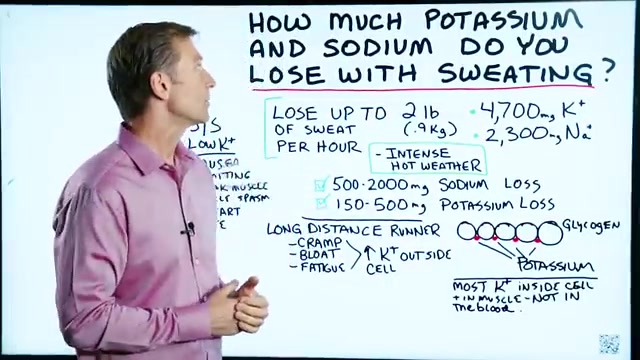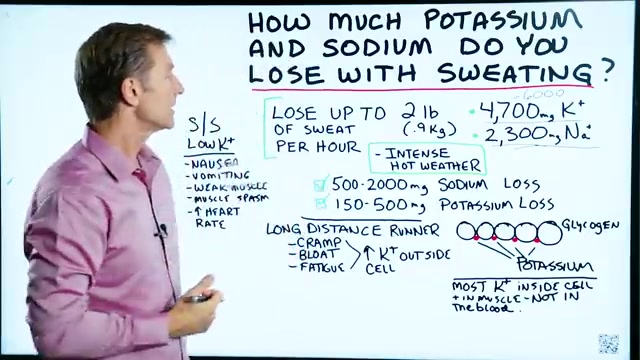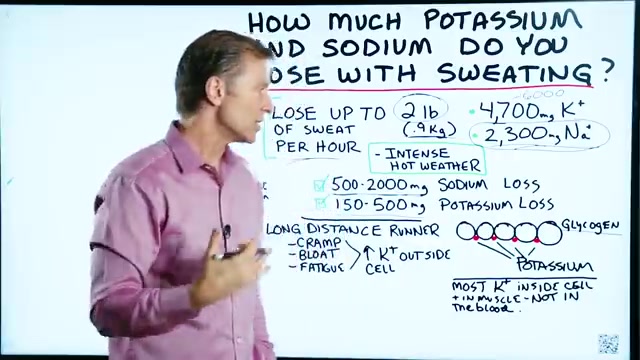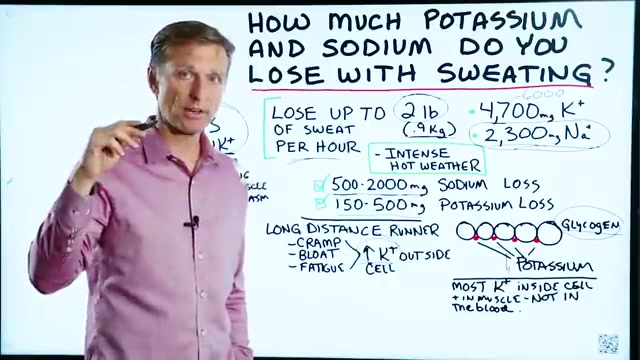
https://www.youtube.com/watch?v=hXXpLDSWhfQ
How Much Potassium is Lost with Sweating

I wanted to cover an important topic if you're an athlete and it relates to how much potassium and sodium do you need when you're actually sweating .
Now the problem is most people think of sodium loss when they're sweating .
They don't think of the potassium loss .
So this video is for that person .
Normally we need about 47 100 milligrams of potassium every single day and you can get by with like 25 , 100 milligrams if you're not exercising , but that's not completing all the functions in the body .
You actually need at least 47 .
And if you're exercising and you're stressed or you have inflammation , you have other problems , especially rheumatoid arthritis , this number could probably go up to 6000 milligrams per day .
Now you need 23 100 milligrams of sodium per day .
That would come out to , I would say about a level teaspoon per day .
But that's from someone that doesn't exercise .

Let's say for example you are working out really intensely outside where it's hot in the summer and you're playing tennis , you could lose up to 2 pounds of sweat .
Now for those people that are on the metric system , a little more advanced than us Americans , that's 0.9 kilograms .
Almost 1 kilogram of sweat every single hour .
So if you're a football player or you're playing tennis or you're in some boot camp or some type of physical activity , you could lose a tremendous amount of fluid .
Now how much sodium loss ?
Well , it's very difficult to tell exactly how much , but it's gonna be between 500 at the very minimum up to 2 , 000 milligrams of sodium loss every single hour .
That's like the almost the entire , recommended daily amount of sodium .
But with potassium , you lose a 150 to 500 milligrams of potassium through the sweat .

Okay ?
But that's not all .
You also have something called glycogen .
Glycogen is stored glucose in your muscle and in your liver .
And any time you store glucose , you need potassium .
So 2 things .
Number 1 , you're using up your glycogen and when you lose up your glycogen when you're exercising , guess what ?
You're losing your potassium too .
So that's in addition to this amount .
Not to mention , if you're a long distance runner , you might be taking glycogen or that goo every hour .
People have been known to take a 100 milligrams of that every single hour when they're in a race .
When you're taking glycogen without potassium , you're depleting your potassium reserves even more because it takes potassium to store glucose as glycogen .
So that would subtract from this even more .


Now this is 1 of the reasons why a long distance runner could get cramps , bloating or fatigue because of the lost potassium even more than the sodium .
Because normally they're taking salt , but they're not considering sodium .
And here are a few more , symptoms of low potassium .
Nausea , vomiting , weak muscles , muscle spasm , and increased heart rate .
And lastly , when you get a blood test , realize that the great majority of potassium in your body like 98.5 percent is inside the cell .
It's in the muscle .
It's not in the blood .
So if you get a blood test , it's very likely that an actual potassium deficiency inside your cells is gonna show positive by testing the blood .
I put some links down below for more data on potassium which I think is important so you can check that out .
Thanks for watching .

If you're liking this content , please subscribe now , and I will actually keep you updated on future videos .
Are you looking for a way to reach a wider audience and get more views on your videos?
Our innovative video to text transcribing service can help you do just that.
We provide accurate transcriptions of your videos along with visual content that will help you attract new viewers and keep them engaged. Plus, our data analytics and ad campaign tools can help you monetize your content and maximize your revenue.
Let's partner up and take your video content to the next level!
Contact us today to learn more.